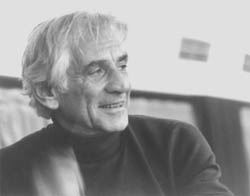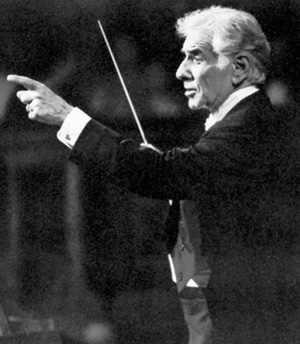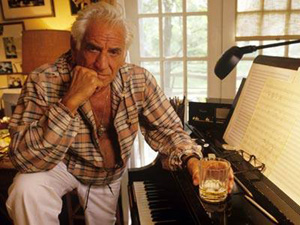

Leonard Bernstein: The Total Musician
A Personal Remembrance
by Jeffrey Dane
(Page 3)
Place in History
A personal "tribute" I once received involved Bernstein, albeit indirectly. When I lived in Europe -- a year as pivotal for me as was the day I first met Mr. Bernstein -- I made the acquaintance of a young lady and her fiance, who for the next thirty years remained among my closest friends. Being aware I knew Leonard Bernstein and had by that point spoken with him so often, the young lady, a pianist, organist and singer, asked me if I could tell her essentially what he was like not just as a musician but specifically as a human being. The best way I could so describe him -- in the "nut-shell" manner she had in mind -- was to tell her, "He's a genius with 'nice guy' qualities." She thought for a moment, and said to me, "I think you're a nice guy with genius qualities." It's for others to say whether or not I was deserving of it, but it was the nicest compliment I had ever received.
Here speaks a Romantic. -- In those days I sometimes felt Leonard Bernstein was so far above me that the only things we had in common were human form and a passion for music. I freely acknowledge that I was in awe of him then. To say so is often trivialized in our day because it's "unfashionable" to admit even to feeling this way at all, about anyone or anything. I, for one, openly do so without reservation. It's astonishing how genuine enthusiasm can be met with such scorn in these times, just as quality is often bypassed for mediocrity.
The sceptics' view that "only the work matters" is commonly accepted but it's also untrue. (Why, then, does Beethoven's signature on a prosaic receipt bring a small fortune at auction?). Great works are produced by human beings -- would it not be logical to conclude that extraordinary work would be the creation of an extraordinary person? To the cynics, I pose these questions: Was Leonard Bernstein not an awesome musician? Did he not have awesome capabilities? Was he not an awesome human being? Did he not accomplish the most awesome musical tasks? And did he not conduct the most awesome performances? -- Isn't it therefore entirely reasonable to suggest that such a view of Bernstein is not only valid, but warranted? I stood in awe of him simply because he was, in a word, awesome.
I see Leonard Bernstein's position in the history of music as being in several ways comparable to that of Franz Liszt. Both men are figures of gargantuan musical importance, and by reason of their versatility they excelled in virtually any musical undertaking, with usually superlative results. Bernstein and Liszt share numerous professional traits (as composer, conductor, pianist, and educator -- with several books to Bernstein's credit as an author), and it is as inevitable as tomorrow morning that Bernstein, through his work, will ultimately reach the same destination in musical history as did Liszt through his.
Like Brahms before him, Bernstein was among the most photographed musicians of his day and was arguably the most photogenic among his contemporaries. Some of his photos illuminate rather than decorate, and show not the shadow but the substance of the subject -- they seem to pierce the armor and offer a glimpse into the sanctum of Leonard Bernstein's complex character and multiplicity of personality. His best photos reflect his legendary personal charisma, his personal warmth, and that elusive quality impossible to truly define, difficult to explain, hopeless to imitate, but very easy to recognize. "When he enters a room, the temperature changes" -- this description of him proves that even two-dimensional, inanimate images can have a lifelike and almost palpable presence. His best photos, even those taken late in his life, capture the very essence of Leonard Bernstein as the eternal youth: the fresh, buoyant and even boyish expressions, the genuine brightness of the smile, and the vitality, vibrancy and sparkle in his eyes render these images of him as portraits
in which he is still very much alive.
Bernstein's Addiction
Whether personal addiction or social diversion, smoking was a feature of Bernstein's personal life. The emblematic and ever-present cigarette became as much a part of his familiar image as the cigar and pipe were distinctive personal hallmarks in the hands of Brahms and Arthur Honegger respectively -- and the glass of Scotch in the hand of Stravinsky. By pre-arrangement, after Bernstein's concerts someone awaited him backstage with an already-lit cigarette ready for him. The fact remains that, for whatever his reasons may have been, he found enjoyment in it -- as others do in alcohol and in driving at high rates of speed.
Photographs taken throughout his life indicate how characteristic of him were the cigarettes in which he evidently took pleasure. In our day, particularly in the USA, smoking is denigrated in the name of health, and smokers are often considered outcasts. We live in an era where nonsense too often masquerades as reason, and where personal desire by those in positions of authority for control and power over others is disguised as concern for the health, safety and welfare of the public.
During the period in which I had consistent contact with him he smoked the American filter cigarette Kent. I was then in my late 'teens and early twenties, impressionable and also impressed with the maestro's genius and ability to succeed in virtually anything he did (musical or otherwise), usually with the exceptional results of which only he was capable. In the spirit of emulation I followed his example for several years, but ultimately adopted a brand of my own choice. He would have echoed the sentiment of Robert Schumann: "You reward your teacher badly when you remain always his pupil." It's more than coincidental that several of Bernstein's own smoker's accessories were sold in 1997 at Sotheby's auction of his estate,
including the cigarette case he used during the 1960s.Some say Bernstein might have lived longer had he not been a smoker. It may be so -- conjecture is fascinating but fruitless -- but his priorities leaned toward the very intensity, almost unparalleled in our century, with which he lived his own life. He chose for himself, not for others, and he's remembered not for human imperfections, which all of us share, but for the unique contributions he made, in which few of us share.
Other Composer Tributes on this website
© 2008-2023 PineTree Productions. All Rights Reserved. Contact: pinetreepro@aol.com







